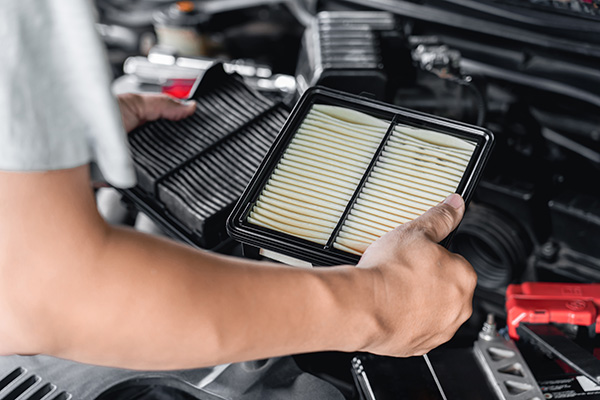
Your car feels a little sluggish lately. It still starts fine, and there are no warning lights on the dash, but when you press the gas pedal, there’s a delay—or just not as much power as you’re used to. Could something as simple as a dirty air filter be the cause? Absolutely. A clogged air filter can make your car feel slower, less responsive, and even burn more fuel than necessary.
While air filters aren’t as flashy as performance parts or tuning upgrades, they’re one of the most important components for maintaining engine health and drivability. Let’s take a closer look at how a dirty air filter impacts acceleration, what signs to watch for, and when it’s time to replace it.
Clean Air Matters for Performance
Your engine needs three things to run properly: fuel, spark, and air. The air filter’s job is to protect the engine from dust, dirt, and debris while allowing enough clean air to flow into the combustion chamber. When that airflow gets restricted, the engine can’t “breathe” the way it should.
Modern engines rely on a precise mixture of air and fuel. When the air filter is dirty and clogged, less air makes it through the intake, causing the engine’s computer to adjust fuel delivery. The result? Reduced power, hesitation when accelerating, and sometimes even engine knocking or rough idling.
It’s especially noticeable when you press the accelerator quickly or try to merge onto the highway. If your car feels like it’s working harder to gain speed, the air filter may be overdue for a change.
Acceleration Suffers With a Dirty Filter
You don’t need to be a car expert to feel when your vehicle isn’t accelerating the way it used to. A dirty air filter can lead to:
- Slower throttle response: You press the gas, but the engine takes a second to respond.
- Lag or hesitation during acceleration, especially at low speeds.
- Decreased engine output, making the car feel underpowered.
- More frequent downshifts in automatic transmissions as the car tries to compensate for lost power.
Over time, the lack of airflow can also affect fuel economy, spark plug condition, and overall engine efficiency. And while your car may still run with a dirty filter, it’s definitely not operating at its best.
When to Replace Your Air Filter
Air filters don’t have to be changed every oil change, but we inspect them every time—especially if you drive in dusty or rural environments or if you're often in stop-and-go traffic. Most manufacturers recommend changing the air filter every 10,000 to 20,000 miles, but this can vary.
Here are a few signs it might be time:
- You notice a loss of power or sluggish acceleration
- Your MPG drops for no apparent reason
- You hear unusual engine sounds, like coughing or popping
- The filter looks gray, dark, or clogged with debris
- The engine air intake smells musty or dirty when the hood is open
Many drivers don’t even realize how restricted their engine feels until after they’ve replaced the filter and felt the improvement firsthand.
It’s a Small Fix With a Big Impact
Replacing an air filter is usually quick and inexpensive—but the benefits can be immediate. It improves engine response, helps maintain proper fuel mixture, and can even reduce harmful emissions. Plus, it helps protect more expensive parts like the mass airflow sensor and throttle body from contamination.
If you’re someone who likes to keep their car performing well without diving into major upgrades or tuning, a clean air filter is one of the best maintenance steps you can take.
Not sure when your air filter was last changed? Stop by The Car Guys, with locations in both Nevada and North Carolina, and let us take a look. Whether your car just feels a little sluggish or you're seeing signs of reduced performance, we’ll check your filter, recommend the right replacement if needed, and make sure your engine is breathing the way it should.
- 10177 West Charleston Blvd. Suite P Summerlin, NV
- 7786 W. Sahara Ave. Las Vegas, NV
- 6311 Carolina Beach Rd. Wilmington, NC
- 8006 Market St. Wilmington, NC